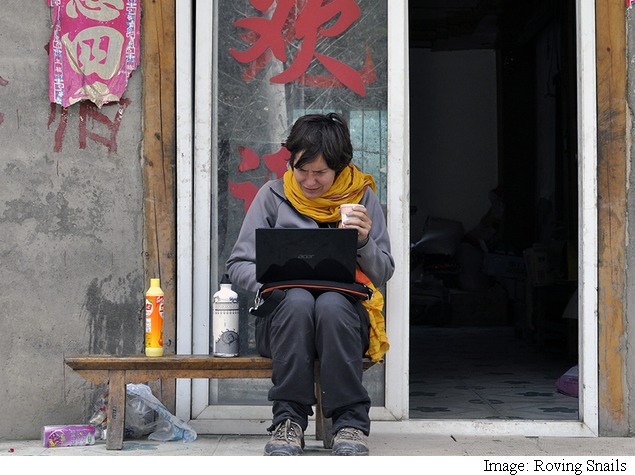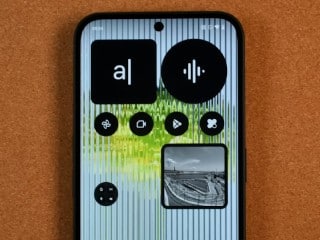- Home
- Culture
- Culture Features
- Hitchhiking From Bulgaria to Bhopal Without a Smartphone
Hitchhiking From Bulgaria to Bhopal Without a Smartphone

In October 2013, Boris Kanev and Marta Samalea set off from Bulgaria with a simple mission - to reach India without taking a plane. The two spent the next 511 days on the road, walking and hitchhiking across Asia until they finally entered the country via Myanmar. As they travelled across some of the remotest parts of the world, they looked up maps, let their families know they were still alive, and even updated a blog, things we all do while travelling. But they made one change you and I perhaps wouldn't even dream about - they did all this without a smartphone.
We first met them in Bhopal earlier this year, and got to talking about their journeys. Since then, we've exchanged a few emails as well, and pieced together their journey, and how they managed to jugaad (improvise) a working Internet connection as they hitchhiked across most of Asia, despite not having what most people would consider an essential companion. The two aren't against using technology, but they just didn't feel that a smartphone would be essential to their travels. Instead, a netbook, a DSLR camera, and an ebook reader were all the gadgets they carried during their trip, aside from old Nokia phone "with an unreliable battery and a failing charger," Kanev told NDTV Gadgets over email.
Kanev and Samalea say that daydreaming about faraway travels has always been a good pastime for them, and a few days after they first met, both thought of hitchhiking to India.
"We both wanted to reach the subcontinent overland, to take every step, and cross each border, to fill the map with pictures of real places, flavours and faces," writes Samalea. "An old map of Asia, invisible routes and more imagination than certainty set the travel plan in motion."
During the course of their journey, Kanev and Samalea realised that not carrying a phone has quite a few benefits. "Probably the main advantage is that we spend more time looking out of the window than into a screen. There is a certain joy in disconnection, in spending days in nature without ringtones or the chance to check Facebook," Kanev writes. "You just live your days fully in the place where you are without the temptation of continuously browsing out of habit rather than need. Plus you don't even have to worry about finding a plug to charge your device."
![]()
Along the way, the couple maintained a blog, called Roving Snails, where they'd post advice for other travellers, write about interesting encounters with people and animals in various places, and even post recipes for hitchhikers. But updating the blog, and mailing friends and family so they would know the couple was fine, were just two things that would have been easier for Kanev and Samalea if they had carried a smartphone.
(Also see: The Digital Traveller in Zurich - Without an Internet Connection)
Finding your way without Google Maps
Not having the Internet to answer all our questions instantly is a challenge, but one that Samalea says she enjoys.
"Naturally, when we are offline we have more questions than answers, we look around, write and draw the thoughts that come. Without having Google to reply straight away, getting information turns into something like a treasure hunt game," Samalea writes.
So, how do you find your way around without Google Maps? The couple often relied on paper maps for directions, and when maps weren't available, they made their own. "We drew a map following weird signs, incomprehensible words, and often contradictory statements [of the people they asked for directions]. We suppose one can end up in the same spots with the right coordinates, but we find some magic in not knowing for certain what's beyond each turn," she writes.
Their old Nokia phone did serve them well in places where they stayed for long, such as Georgia, Iran and Thailand. On the road though, even the Nokia phone wasn't of much use to Kanev and Samalea. "In general, we are of opinion that smartphones are more of a comfort than an actual necessity," says Kanev. "They might come very handy when it comes to maps and ease your life in a foreign city. Some of our friends use them to book hostels online, but since we are usually camping we never even thought of such a use."
Without a smartphone or 3G access, they tell us that the real challenge was finding ways to access the Internet during their journey; and they had plenty of bad experiences with Internet cafes along their way.
"Internet cafes are the devil's invention, with keyboards that never work, missing letters, fading signal, loud noise and even louder music," Samalea writes. One of their worst encounters with cyber-cafes was in India. The two spent hours searching for an Internet cafe in Aizawl, Mizoram, in order to tell their families that they had reached the city safely. They finally came across a Internet cafe signboard that pointed towards a flight of stairs. They climbed up into a dingy looking building, their long search seemingly over, only to find that the cyber-cafe had shut down.
"The cafe had long ago been turned into a beauty parlour. And the owner told us 'most people have smartphones these days'," writes Samalea. Luckily, the story had a happy ending. The two took what they call "an emergency measure which has always worked for us". The two walked into the reception of the most posh hotel they could find and asked if they could use the Wi-Fi for 10 minutes. "That time in Aizawl, the hotel staff was so kind, that we got tea and biscuits and spent the morning in their lobby."
Could you last a week without the Internet?
The couple say that the longest they travelled without Internet access was two weeks, but this happened to them more than once. They tell us that the longest times they spent offline were while hiking in Turkey, hitchhiking in Myanmar, and walking from Manipur to Mizoram - each of these times lasting for a couple of weeks. They say that they usually try to go online once every one to three days to speak with their friends and family and to update their blog.
"During the times we are disconnected we often write down in our diaries questions, notes, thoughts and stuff we would like to check online, so when we have the chance to look them up," Samalea writes. It's a pretty unusual way to take Google offline, but it seems to have worked for them.
(Also see: Seven Must-Have Gadgets for Every Frequent Traveller)
![]()
Spending even a day without Internet might seem to be too much of a task for many (like us), but it wasn't a problem for the two hitchhikers. Grasping cultural nuances proved to be a far bigger challenge than finding Internet access. One of the technological hurdles they faced was in Iran, where international credit or debit cards don't work. This means that you can only use credit or debit cards issued in Iran, when in the country. There was no solution for this, and the only choice was to carry a lot of cash. "As laid back as our travel may seem, it actually involves quite a lot of preparation," Kanev writes. "We check in advance if one can get cash, where is best to exchange money, how hitchhiking works or whether camping is allowed."
But no amount of planning can account for unfortunate incidents along the road. When they were in Dege, a small Tibetan town in the Sichuan province of China, they miscalculated the amount of local currency they needed to carry. Kanev writes, "After a very long and dusty road across Tibetan mountains, a few sleepless nights, [we were] tired and Marta [Samalea] had a bleeding leg due to an unfortunate encounter with a nasty dog. We walked for hours the streets of Dege searching for anyone who could exchange US dollars for Chinese yuan to cover the rabies vaccine and a few nights of hostel stay to rest."
"No ATMs worked, no bank wanted to exchange and nobody seemed to care that we would otherwise need to travel all the way back through the dusty road and mountains, for a few days, to who knows where," he adds. "Desperate and lonely, Marta sat down on the pavement and started to cry." The language barrier was a big hurdle in this place, but it did lead to the two learning an interesting thing about the local culture.
A woman approached Kanev and he managed to explain the problem through the rough use of sign language. "It took her just seconds to improvise a street alms round on our behalf: mothers, kids, grandmas, monks, shopowners and waiters from a nearby restaurant... the pile of money grew larger and larger," he tells us. "Still, nobody was willing to exchange the dollars, but the shower of offered yuans kept on pouring until the police took us away."
The police told them that none of the people wanted anything in return for their help, "because altruism is the nature of good actions". Kanev writes, "[They told us that ] if we wanted to continue the circle of good deeds, we could simply return the money to Buddha at any temple or monastery."
Learning for yourself
A smartphone might have helped the couple get their message across faster, it certainly wouldn't have educated them about the cultural nuances of the places they visited. During their travels, the two came across several "cultural peculiarities" in various places. "We learnt that it was impolite to refuse a drink in Georgia even if it was vodka at 10 am, that a cup of tea is always followed by another in Iraqi Kurdistan, that Iranians would offer each gift three times, and one would need to refuse it twice to be sure the offer was genuine (taarof)," Kanev writes.
The language didn't prove to be that big a barrier for the two. Where we would recommend a crash course using Duolingo to pick up a language, or make use of Google Translate if you didn't have the time for that, the two managed to pick up a number of languages even without these tools.
Samalea writes, "During our first days in every country we usually gather useful words and phrases, write them down and try communicating. The result is usually a lots of fun and misunderstanding, but people most of the time find it cute because it shows interest in their place." They also didn't always have to learn the local language as most countries have a commonly spoken foreign language - like English is in India. Kanev speaks Russian, so travelling in Central Asia did not prove to be much of a problem.
"But in general, we learnt that language goes way beyond letters, syllables and phrases and even that communication is rarely confined to language, plus Marta always carries a drawing pad [she drew objects they didn't know the names of]," Kanev tells us. The couple wrote that their only problem with language was in China. "But there almost everybody has a smartphone, so translators coped easily with the hard part and conversations happened through someone else's phone screen," he adds.
Throughout their travels they had various encounters with technology but the funniest encounter was in India. In the Unakoti hill area of Tripura the couple met a sadhu who told them that one doesn't need phones to talk to the gods. "We had reached the site in search for the giant sculptures of Lord Shiva that we had heard were to be found there. We stayed and made friends with a sadhu," Samalea tells us.
The sadhu spoke little English, and Kanev and Samalea didn't speak his language [Bengali], but they wrote that "he was the kind of man who can speak without words". They spent a couple of days with the sadhu and on the first night the couple could hear claps of thunder and felt that a storm was approaching. "We started to unpack our bags, searching around for a good place to hide or set the tent in between festival stalls, pilgrims and sculptures, and asked our friend sadhu baba if it usually rained long during the night. Our tent is old and leaks by now, and we hate waking up with a puddle inside," Samalea writes.
That's when the sadhu grabbed a horn and held it to his ear like a phone. "'Alpha, beta, Hareee Rama!' - he grabbed his horn and pretended it was a phone, turning his gaze towards the sky - 'Haree Krishna! Tourists ask if it will rain tonight'. A conversation unfolded, in a mix of Bengali and military code words, but we only understood that the gods had responded when he thanked them and said 'over', hanging up the made up phone which turned back into a ritual horn," writes Samalea. "'Slightly' - he said - 'no need for a tent'. With thunder and lightning in the background we went to sleep under a mere mosquito net, trusting the holy message in a leap of faith. In the morning, Sadhu Baba was smiling with a cup of chai. He had been right, proud of his diviner's skills, and glad that we were all dry."
She adds that if they'd had an iPhone, a fancy app might have predicted the weather, but on that night there was no need for it as they had "other means to reach the sky".
Boris Kanev and Marta Samalea started their journey in October 2013, and have been documenting their experiences on their blog, Roving Snails.
Get your daily dose of tech news, reviews, and insights, in under 80 characters on Gadgets 360 Turbo. Connect with fellow tech lovers on our Forum. Follow us on X, Facebook, WhatsApp, Threads and Google News for instant updates. Catch all the action on our YouTube channel.
Related Stories
- Samsung Galaxy Unpacked 2026
- iPhone 17 Pro Max
- ChatGPT
- iOS 26
- Laptop Under 50000
- Smartwatch Under 10000
- Apple Vision Pro
- Oneplus 12
- OnePlus Nord CE 3 Lite 5G
- iPhone 13
- Xiaomi 14 Pro
- Oppo Find N3
- Tecno Spark Go (2023)
- Realme V30
- Best Phones Under 25000
- Samsung Galaxy S24 Series
- Cryptocurrency
- iQoo 12
- Samsung Galaxy S24 Ultra
- Giottus
- Samsung Galaxy Z Flip 5
- Apple 'Scary Fast'
- Housefull 5
- GoPro Hero 12 Black Review
- Invincible Season 2
- JioGlass
- HD Ready TV
- Latest Mobile Phones
- Compare Phones
- Tecno Pova Curve 2 5G
- Lava Yuva Star 3
- Honor X6d
- OPPO K14x 5G
- Samsung Galaxy F70e 5G
- iQOO 15 Ultra
- OPPO A6v 5G
- OPPO A6i+ 5G
- Asus Vivobook 16 (M1605NAQ)
- Asus Vivobook 15 (2026)
- Brave Ark 2-in-1
- Black Shark Gaming Tablet
- boAt Chrome Iris
- HMD Watch P1
- Haier H5E Series
- Acerpure Nitro Z Series 100-inch QLED TV
- Asus ROG Ally
- Nintendo Switch Lite
- Haier 1.6 Ton 5 Star Inverter Split AC (HSU19G-MZAID5BN-INV)
- Haier 1.6 Ton 5 Star Inverter Split AC (HSU19G-MZAIM5BN-INV)







![[Partner Content] OPPO Reno15 Series: AI Portrait Camera, Popout and First Compact Reno](https://www.gadgets360.com/static/mobile/images/spacer.png)









